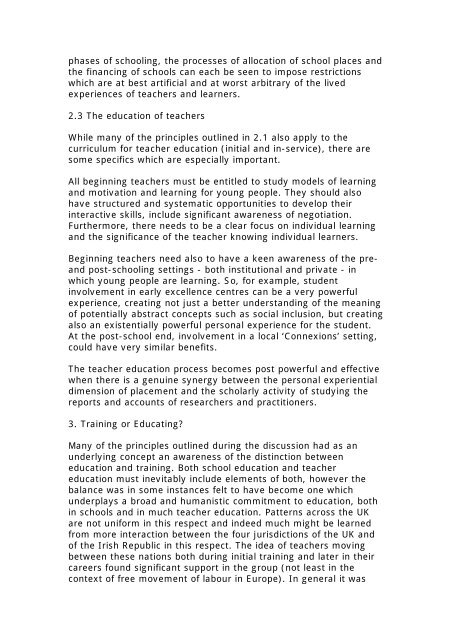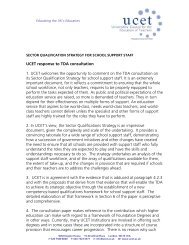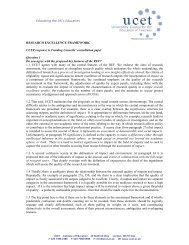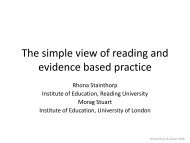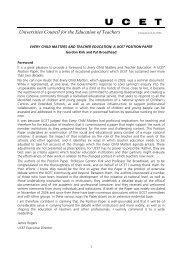The School Curriculum Ten Years Hence - UCET: Universities ...
The School Curriculum Ten Years Hence - UCET: Universities ...
The School Curriculum Ten Years Hence - UCET: Universities ...
Create successful ePaper yourself
Turn your PDF publications into a flip-book with our unique Google optimized e-Paper software.
phases of schooling, the processes of allocation of school places and<br />
the financing of schools can each be seen to impose restrictions<br />
which are at best artificial and at worst arbitrary of the lived<br />
experiences of teachers and learners.<br />
2.3 <strong>The</strong> education of teachers<br />
While many of the principles outlined in 2.1 also apply to the<br />
curriculum for teacher education (initial and in-service), there are<br />
some specifics which are especially important.<br />
All beginning teachers must be entitled to study models of learning<br />
and motivation and learning for young people. <strong>The</strong>y should also<br />
have structured and systematic opportunities to develop their<br />
interactive skills, include significant awareness of negotiation.<br />
Furthermore, there needs to be a clear focus on individual learning<br />
and the significance of the teacher knowing individual learners.<br />
Beginning teachers need also to have a keen awareness of the preand<br />
post-schooling settings - both institutional and private - in<br />
which young people are learning. So, for example, student<br />
involvement in early excellence centres can be a very powerful<br />
experience, creating not just a better understanding of the meaning<br />
of potentially abstract concepts such as social inclusion, but creating<br />
also an existentially powerful personal experience for the student.<br />
At the post-school end, involvement in a local ‘Connexions’ setting,<br />
could have very similar benefits.<br />
<strong>The</strong> teacher education process becomes post powerful and effective<br />
when there is a genuine synergy between the personal experiential<br />
dimension of placement and the scholarly activity of studying the<br />
reports and accounts of researchers and practitioners.<br />
3. Training or Educating?<br />
Many of the principles outlined during the discussion had as an<br />
underlying concept an awareness of the distinction between<br />
education and training. Both school education and teacher<br />
education must inevitably include elements of both, however the<br />
balance was in some instances felt to have become one which<br />
underplays a broad and humanistic commitment to education, both<br />
in schools and in much teacher education. Patterns across the UK<br />
are not uniform in this respect and indeed much might be learned<br />
from more interaction between the four jurisdictions of the UK and<br />
of the Irish Republic in this respect. <strong>The</strong> idea of teachers moving<br />
between these nations both during initial training and later in their<br />
careers found significant support in the group (not least in the<br />
context of free movement of labour in Europe). In general it was


